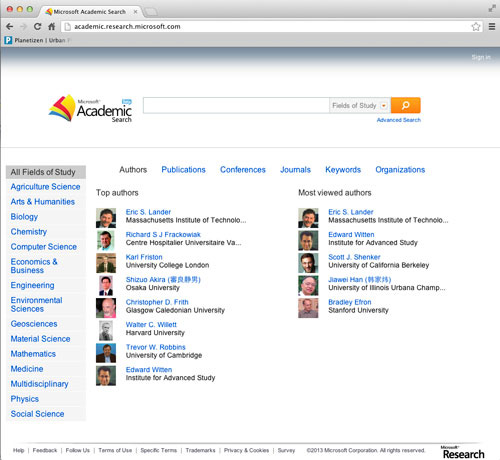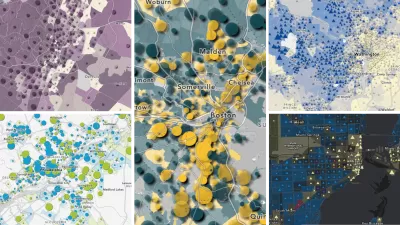Urban planning professionals and researchers increasingly face information overload. Todd BenDor and Rob Goodspeed suggest three techniques for strategically monitoring the web for new research and ideas.

Urban planning professionals and researchers increasingly face information overload. With stuffed email boxes, piles of magazines and articles, and proliferating social media, professionals have more sources at their disposal than ever for tracking the latest developments in their fields. Researchers also face challenges as the number of journals increases, including the proliferation of online-only and discipline-specific publications. What can we do to stay current? How can we manage this barrage of new, and potentially useful, information? This article focuses on three techniques for avoiding information overload and strategically monitoring the web for new research and ideas: search, journal alerting services, and RSS feeds.
Search
When most of us want to search for new ideas or academic research in our field we usually turn to Google or other search engines, much as we do with any other Internet search we use in our daily lives. Google Scholar acts as a meta-search across commonly indexed academic journals, government websites and patent databases, and other “gray literature” (reports, white papers, etc.). Microsoft Academic Search is a sophisticated engine that expands the ability of the public to search for academic work by showing related studies and depicting the networks of researchers and authors working in a field or sub-field. Microsoft Academic Search also augments searches by presenting information on the timelines of research programs (e.g. follow-up studies and additional case studies by the same authors). Likewise, Wolfram Alpha, which calls itself a “computational knowledge engine,” has become sophisticated enough to perform complex calculations and currently forms the backbone of SIRI, the voice-controlled assistant used in Apple iPhones.

However, like other search techniques, these tools require user effort to seek out the information they want. This requires initiative, a detailed understanding of the field of interest, and a self-created technique for organizing information collected. For example, if I wanted to find all the information on form-based zoning codes and their relationship with the environment, I’d need to perform searches on a variety of keywords, and create my own database of pertinent papers, assuming I could access them. These can be surprisingly high barriers for research, particularly for those that are new to a field. Although search remains the standard for accessing pertinent academic literature, journal subscriptions and RSS allow you to proactively monitor for new research.
Subscription and Alert Services
Perhaps the most common way that many academics stay up to date with journals they follow is through an email subscription to that journal’s table of contents (TOC), which provides email alerts whenever a new issue is published. Interested parties can sign up for these emails through journal websites and receive updates when articles are formally published, making it easy to track dozens of journals at a time (though the researcher will receive dozens of emails a month with journal updates!). TOC subscriptions make it easy to stay apprised of new information and research across a broad range of fields. While this is certainly more convenient than searching for interesting articles, TOC subscriptions are limited in their frequency and specificity.
As research communities have grown, the backlog of articles waiting to be published at many journals now extends to over a year. This means that many journals publish articles on their websites before they appear in a TOC email. Furthermore, the TOC contains all articles published in a journal, requiring one to read through the titles and abstracts of the entire journal to find relevant pieces. This unfiltered information can be quite burdensome to evaluate.
New tools can be used to track topics regardless of where the information is published. Google Alerts monitors general web results, blogs, and news items, and can produce email and RSS feeds. Google Scholar alerts (http://scholar.google.com and click “Alerts”), which tracks new items in the site’s database of scholarly articles and citations, is currently only available by email. In addition, scholarly databases and publishers of academic journals (such as ScienceDirect or Taylor & Francis) allow users to register for free and create custom alerts (by email or RSS) for new articles containing certain keywords, or other advanced alerts such as notifications when a specific article is cited.
Really Simple Syndication (RSS)
Although RSS has been widely used for over a decade, recent developments make it increasingly useful for monitoring developments in urban planning. Although email newsletters are useful, they can be easy to overlook. Monitoring journals, thought leaders, and professional organizations through RSS allows you to keep this content separate from your email, easily organized for when you have time to review articles.
Most scholarly journals offer RSS feeds that provide Table of Contents (or TOC) alerts for free, even for non-subscribers. (For example, here are links to the RSS feeds for the Journal of the American Planning Association and the Journal of Planning Education and Research). In addition, some publishers provide additional feeds for each journal. These often promote articles published online in advance of print and track the most cited or viewed articles for that particular journal. Recent graduates can often gain access to academic journals through their school’s alumni association membership.
Most RSS readers provide the ability to search recent items. If you track key publications in your area of interest, this means you can search relevant literature and academic journals from your own personalized literature database. They also allow you to flag articles for later review, or quickly send them to a colleague.
Conclusion
New technologies are resulting in greater access to information than ever before, but the savvy user can take advantage of new tools for efficient tracking and research. We invite readers to share their own tips and tricks on this topic in the comments below.
Todd BenDor is an Assistant Professor of City and Regional Planning at the University of North Carolina at Chapel Hill. His research and teaching focus on urban growth modeling, environmental conflict resolution, and the intersection of planning and emerging markets for ecosystem services.
Rob Goodspeed is a PhD Candidate at the MIT Department of Urban Studies and Planning. His research focuses on planning support tools and social learning, and the impact of new technologies on participatory planning.
Additional Resources
MIT Libraries Google Search Tips (http://libguides.mit.edu/content.php?pid=104796&sid=788989)
MIT Libraries Guide on RSS, Email, and Table of Contents Alerts (http://libguides.mit.edu/rss)
LaGuardia Community College: Using RSS to Keep Up with Scholarly Research (step-by-step guide) (Part 1, Part 2) (http://library.laguardia.edu/research/rssguide, http://library.laguardia.edu/research/rssguide2 )
UC Berkeley: Introduction to RSS (http://lib.berkeley.edu/BIOS/rss.html)
Wikipedia’s list of academic databases and search engines (http://en.wikipedia.org/wiki/List_of_academic_databases_and_search_engines)
Bruce Stiftel & Rebecca Mogg (2007): A Planner's Guide to the Digital Bibliographic Revolution, Journal of the American Planning Association, 73:1, 68-85. [http://dx.doi.org/10.1080/01944360708976137]

Trump Administration Could Effectively End Housing Voucher Program
Federal officials are eyeing major cuts to the Section 8 program that helps millions of low-income households pay rent.

Planetizen Federal Action Tracker
A weekly monitor of how Trump’s orders and actions are impacting planners and planning in America.

Canada vs. Kamala: Whose Liberal Housing Platform Comes Out on Top?
As Canada votes for a new Prime Minister, what can America learn from the leading liberal candidate of its neighbor to the north?

Washington State’s Parking Reform Law Could Unlock ‘Countless’ Acres for New Housing
A law that limits how much parking cities can require for residential amd commercial developments could lead to a construction boom.

Wildlife Rebounds After the Eaton Fire
Following the devastation of the Eaton Fire, the return of wildlife and the regrowth of native plants are offering powerful signs of resilience and renewal.

LA to Replace Inglewood Light Rail Project With Bus Shuttles
LA Metro says the change is in response to community engagement and that the new design will be ready before the 2028 Olympic Games.
Urban Design for Planners 1: Software Tools
This six-course series explores essential urban design concepts using open source software and equips planners with the tools they need to participate fully in the urban design process.
Planning for Universal Design
Learn the tools for implementing Universal Design in planning regulations.
Central Transportation Planning Staff/Boston Region MPO
Heyer Gruel & Associates PA
Institute for Housing and Urban Development Studies (IHS)
City of Grandview
Harvard GSD Executive Education
Regional Transportation Commission of Southern Nevada
Toledo-Lucas County Plan Commissions





























